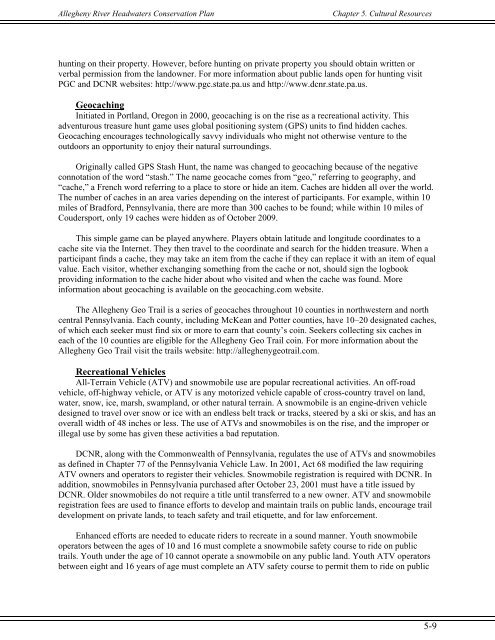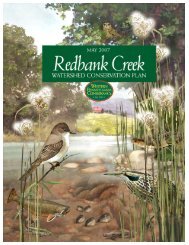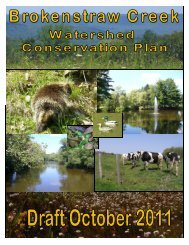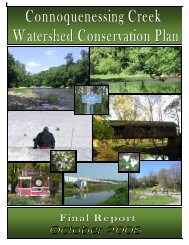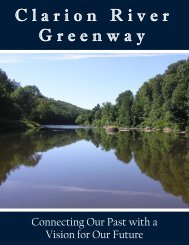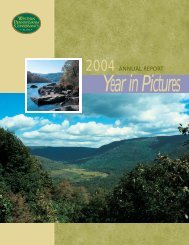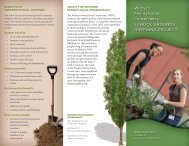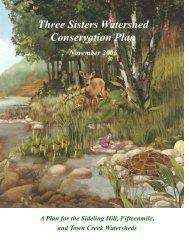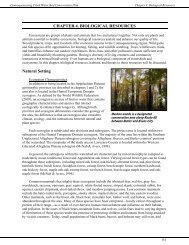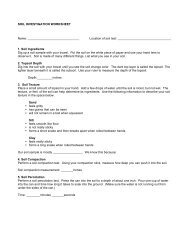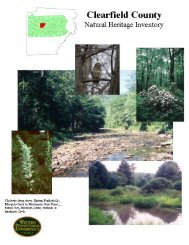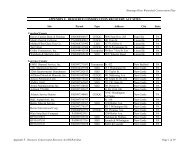Allegheny River Headwaters Watershed Conservation Plan
Allegheny River Headwaters Watershed Conservation Plan
Allegheny River Headwaters Watershed Conservation Plan
You also want an ePaper? Increase the reach of your titles
YUMPU automatically turns print PDFs into web optimized ePapers that Google loves.
<strong>Allegheny</strong> <strong>River</strong> <strong>Headwaters</strong> <strong>Conservation</strong> <strong>Plan</strong><br />
Chapter 5. Cultural Resources<br />
hunting on their property. However, before hunting on private property you should obtain written or<br />
verbal permission from the landowner. For more information about public lands open for hunting visit<br />
PGC and DCNR websites: http://www.pgc.state.pa.us and http://www.dcnr.state.pa.us.<br />
Geocaching<br />
Initiated in Portland, Oregon in 2000, geocaching is on the rise as a recreational activity. This<br />
adventurous treasure hunt game uses global positioning system (GPS) units to find hidden caches.<br />
Geocaching encourages technologically savvy individuals who might not otherwise venture to the<br />
outdoors an opportunity to enjoy their natural surroundings.<br />
Originally called GPS Stash Hunt, the name was changed to geocaching because of the negative<br />
connotation of the word “stash.” The name geocache comes from “geo,” referring to geography, and<br />
“cache,” a French word referring to a place to store or hide an item. Caches are hidden all over the world.<br />
The number of caches in an area varies depending on the interest of participants. For example, within 10<br />
miles of Bradford, Pennsylvania, there are more than 300 caches to be found; while within 10 miles of<br />
Coudersport, only 19 caches were hidden as of October 2009.<br />
This simple game can be played anywhere. Players obtain latitude and longitude coordinates to a<br />
cache site via the Internet. They then travel to the coordinate and search for the hidden treasure. When a<br />
participant finds a cache, they may take an item from the cache if they can replace it with an item of equal<br />
value. Each visitor, whether exchanging something from the cache or not, should sign the logbook<br />
providing information to the cache hider about who visited and when the cache was found. More<br />
information about geocaching is available on the geocaching.com website.<br />
The <strong>Allegheny</strong> Geo Trail is a series of geocaches throughout 10 counties in northwestern and north<br />
central Pennsylvania. Each county, including McKean and Potter counties, have 10–20 designated caches,<br />
of which each seeker must find six or more to earn that county’s coin. Seekers collecting six caches in<br />
each of the 10 counties are eligible for the <strong>Allegheny</strong> Geo Trail coin. For more information about the<br />
<strong>Allegheny</strong> Geo Trail visit the trails website: http://alleghenygeotrail.com.<br />
Recreational Vehicles<br />
All-Terrain Vehicle (ATV) and snowmobile use are popular recreational activities. An off-road<br />
vehicle, off-highway vehicle, or ATV is any motorized vehicle capable of cross-country travel on land,<br />
water, snow, ice, marsh, swampland, or other natural terrain. A snowmobile is an engine-driven vehicle<br />
designed to travel over snow or ice with an endless belt track or tracks, steered by a ski or skis, and has an<br />
overall width of 48 inches or less. The use of ATVs and snowmobiles is on the rise, and the improper or<br />
illegal use by some has given these activities a bad reputation.<br />
DCNR, along with the Commonwealth of Pennsylvania, regulates the use of ATVs and snowmobiles<br />
as defined in Chapter 77 of the Pennsylvania Vehicle Law. In 2001, Act 68 modified the law requiring<br />
ATV owners and operators to register their vehicles. Snowmobile registration is required with DCNR. In<br />
addition, snowmobiles in Pennsylvania purchased after October 23, 2001 must have a title issued by<br />
DCNR. Older snowmobiles do not require a title until transferred to a new owner. ATV and snowmobile<br />
registration fees are used to finance efforts to develop and maintain trails on public lands, encourage trail<br />
development on private lands, to teach safety and trail etiquette, and for law enforcement.<br />
Enhanced efforts are needed to educate riders to recreate in a sound manner. Youth snowmobile<br />
operators between the ages of 10 and 16 must complete a snowmobile safety course to ride on public<br />
trails. Youth under the age of 10 cannot operate a snowmobile on any public land. Youth ATV operators<br />
between eight and 16 years of age must complete an ATV safety course to permit them to ride on public<br />
5-9


